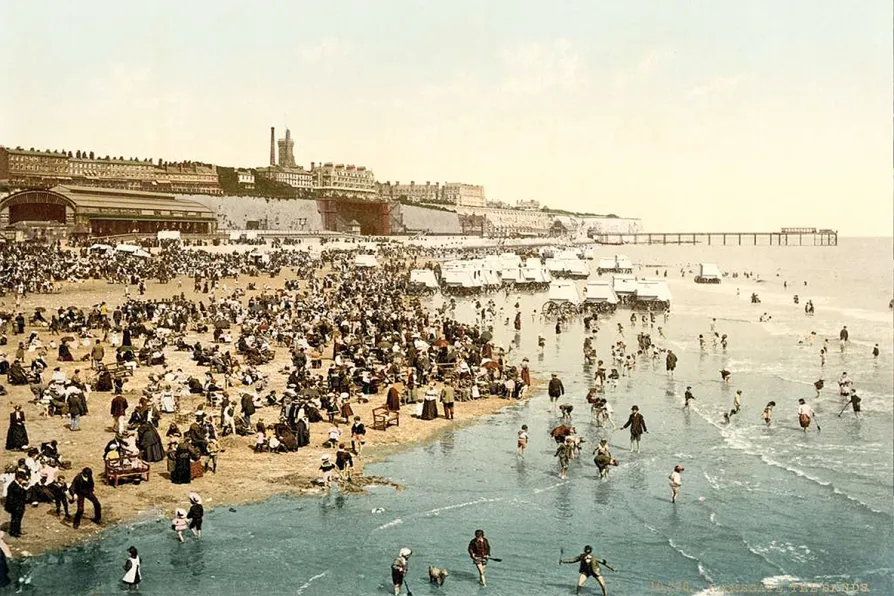The US-Israeli strikes against Iran are part of a decades-long war against the Islamic Republic which has refused to bow to US demands that it surrender its sovereignty, argues VIJAY PRASHAD
The summer saw the co-founders of modern communism travelling from Ramsgate to Neuenahr to Scotland in search of good weather, good health and good newspapers in the reading rooms, writes KEITH FLETT

 Ramsgate beach, 1899
Ramsgate beach, 1899
FRIEDRICH ENGELS retired from the family firm in Manchester in 1870 and moved to north London. Marx was an independent researcher, writer and activist. He did once apply for a job as a railway clerk, but was rejected as his writing was illegible.
This meant that both Marx and Engels had ample scope for summer holidays. These were often taken in Britain, but not exclusively so.
While many modern holidays are about a break from work, here matters were more complex. Both Marx and Engels saw a vacation as a way of dealing with various health issues — often by the sea or at a spa. They also still engaged in political correspondence in an age when the postal service often worked on same-day delivery of letters.
In the summer of 1877, Engels’ partner Lizzie Burns was unwell, and between July 11 and August 28, they stayed at a favourite seaside location of Ramsgate in Kent. Unfortunately, the sea air and water did not affect a significant improvement in her health, and Engels looked to an alternative location.
Marx wrote to Wilhelm Bracke on August 8 1877, noting that Engels could not assist with an issue and was looking at visiting either Jersey or the Isle of Man, both locations familiar to them.
Marx was not a fan, complaining on a visit to Jersey that he had become a vegetarian due to being fed an unvaried diet of lamb, and suggesting to Engels that he found the Isle of Man “smelly.”
Engels wrote to Marx on August 25 1877: “We leave here on Tuesday after a seven-week stay which has done me a great deal of good but fallen far short of our expectations so far as Lizzie is concerned. Weather permitting, I shall probably have to subject her to an even more drastic change of air.”
Engels continued to Marx that the weather in Ramsgate had been good: “We have done splendidly here. When it was raining everywhere else, it was merely overcast here. Two rainy afternoons in seven weeks, and today the first really wet day — and even then with longish breaks — so one can hardly complain of that. The rain, such as it was, fell mostly at night.”
Engels returned to London and then, from September 5-21, 1877, he went with Burns to Scotland. Engels noted that letters would not be able to reach him there, but planned to communicate with those looking after his Regents Park Road house by telegraph. The telegraph is sometimes called the “Victorian internet” but unfortunately, the messages Engels sent are not known to have survived.
Meanwhile, during August 1877, Marx was at the German spa town of Neuenahr, staying at the Hotel Flora, again for health reasons. At the time, the area had no railways and writing to Engels on August 17 1877, Marx described it as a “rural idyll” with limited numbers of visitors due to a “commercial crisis.”
Marx noted: “At the spa rooms here (where, like everywhere else, one takes baths as well as drinking the alkaline tipple) there is a reading room in which are available, not only German and Dutch newspapers, but also the Times and Galignani’s Messenger, Figaro — more than my requirements.”
Marx went on to note that “some red wine” was drunk, including specialities of the Ahr Valley, but that he was forbidden to drink them, having to stick to spa water for his health cure.
Certainly, in the summer of 1877, while Marx and Engels’ holiday vacations were varied, as of course was the weather and the locations, the focus was as much on health as leisure. A summer holiday perspective as much for 2025 as for 1877.
Keith Flett is a socialist historian. Follow him on X @kmflett.

Who you ask and how you ask matter, as does why you are asking — the history of opinion polls shows they are as much about creating opinions as they are about recording them, writes socialist historian KEITH FLETT

KEITH FLETT revisits the 1978 origins of Britain’s May Day bank holiday — from Michael Foot’s triumph to Thatcher’s reluctant acceptance — as Starmer’s government dodges calls to expand our working-class celebrations












